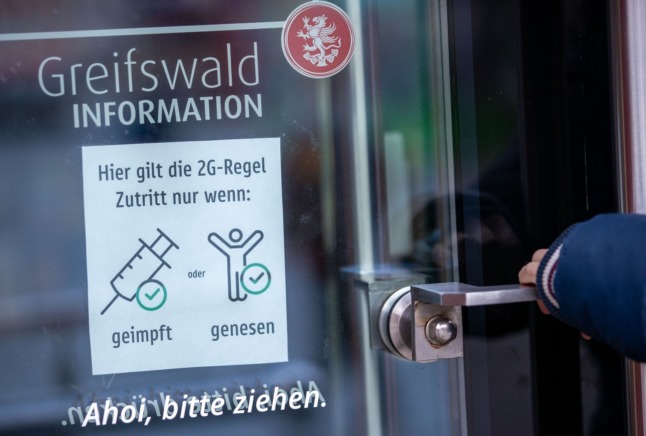How worried should we be about Germany's rocketing Covid rates?

Germany is seeing a spike in Covid infections amid the Omicron wave. How worried should we be about these high numbers?
With over 200,000 daily Covid infections logged on Thursday in Germany, it's clear the country is in the grip of the Omicron wave.
On Friday, health authorities reported 190,148 Covid cases within the latest 24 hour period, and 170 deaths. The 7-day incidence reached a huge 1,073 Covid infections per 100,000 people - numbers we have never seen before.
Spelling it out, the Robert Koch Institute (RKI), said in its weekly report that "the fifth wave of the Covid-19 pandemic" has "gained momentum with the dominant circulation of the Omicron variant".
So how dangerous are these increasing numbers? We took a look at the latest data, and what experts had to say.
READ ALSO:
- Germany sees more than 200,000 Covid infections in a day
- Germany has Omicron wave 'well under control', says Health Minister
What's the situation in hospitals?
Scientists and politicians are watching what's going on in German clinics very closely.
At the moment, there hasn't been a spike in hospital admissions, but intensive care units are still struggling especially in some areas.
"The burden on intensive care units continues due to the large number of very severely ill people with Covid-19, but currently shows no increasing trend," said the RKI.
On January 27th, there were a reported 2,274 Covid patients in intensive care units in Germany, with 1,283 receiving ventilation treatment.
But the development varies widely depending on the state.
In Bremen, for instance, the 7-day incidence of Covid hospital admissions is 13.82 per 100,000 residents. In Schleswig-Holstein it's 6.32 and in Berlin its 3.98.
Bavaria's hospitalisation incidence is 5.15.
The RKI believes "there is a risk of the health system becoming overloaded" due to the rapid increase in infections.
According to experts at the institute, those most affected by severe illness when they get Covid continue to be "unvaccinated people and people with pre-existing diseases that weaken the immune system".
"By far the highest incidence of hospitalisation is among people over 80 years of age," they added.

A '2G' sign for entry into the Greifswald Information site in the Town Hall. Photo: picture alliance/dpa/dpa-Zentralbild | Jens Büttner
READ ALSO: Are Germany's Covid rules backed up by science
Scientists believe that the Omicron variant is less likely to make people seriously ill than other strains of Covid - but that often depends on vaccination status, says the RKI.
"Studies indicate a lower proportion of hospitalisations compared to infections with the Delta variant in infected persons with complete vaccination or booster vaccination," the institute said in the weekly report.
However, experts in Germany are worried about the effect of Omicron on the older population, particularly because around three million of the over 60s are unvaccinated.
The RKI said data "is still insufficient for a conclusive assessment of the severity of the disease caused by the Omicron variant, especially in the elderly population".
That's because they believe the variant hasn't fully hit older people yet in the same way as younger age groups.
However, on Friday the German Health Minister struck a positive note during the weekly press conference.
“I believe we currently have the Omicron wave well under control,” said Karl Lauterbach, although he flagged up that he is concerned about the older unvaccinated population.
What do other experts say?
Bremen-based infectious disease epidemiologist Hajo Zeeb of the Leibniz Institute for Prevention Research and Epidemiology sees "light at the end of the tunnel" with the Omicron wave.
Due to the high infection rate with Omicron, he says almost everyone will become infected by it.
"Because at the same time the courses of the disease are milder, especially in comprehensively vaccinated people, there is therefore a chance of reaching a state of broad basic immunisation of society", Zeeb told the Weser-Kurier newspaper.
Christian Karagiannidis, head of the ECMO Centre at the Cologne-Merheim Lung Clinic and member of the German government's expert council, said he is concerned about Omicron wreaking havoc - especially when it comes to staff absences and the burden on hospitals and in the outpatient sector.
But he is positive about spring.
"I am basically optimistic that in a few weeks we will barely talk about corona, and the chance of (Covid becoming an) endemic disease in 2022 will become tangible," he told Tagesschau.
"The sooner everyone is vaccinated, the sooner we will be there."

A sign for a vaccination and testing site in Munich. Photo: picture alliance/dpa | Peter Kneffel
However, Karagiannidis does have concerns about next autumn if not enough people get vaccinated.
So should we be worried about getting Omicron?
Many people in Germany are seeing red alerts on their Corona warning app for the first time, or are hearing about lots of friends or family getting the virus. This is clearly a sign that the virus is very widespread.
There is a much higher chance of getting Covid now, but experts warn against trying to get it.
The idea of people deliberately doing that in order to gain immunity through a supposedly mild course of disease is absurd, high profile virologist Sandra Ciesek said during a recent episode of the NDR podcast.
"I don't deliberately infect myself with the hepatitis C virus just because it can be treated well," said Ciesek.
Data from South Africa appears to show that unvaccinated people develop specific immune reactions to Omicron, but barely any antibodies against Delta.
"So we have to assume that these people could be re-infected with Delta if it circulates again," Ciesek said.
And there are concerns that another variant or mix of variants will emerge.
Virologist Christian Drosten told Deutschlandfunk Radio that people who've had Omicron could get re-infected. There are various possibilities of how Omicron could develop from a rather mild variant into a more worrying one, he said, adding that he fears a combination of Omicron and Delta.
It could be that in the future a virus will emerge that on the one hand "carries the spike protein of the Omicron virus in order to continue to enjoy this immune advantage, but has the rest of the genome of the Delta virus", said Drosten.
The strategy of "we all infect ourselves with the mild Omicron and afterwards everyone is immune" is therefore a fallacy, said Drosten, adding that vaccination is the best protection.
READ ALSO: What to know about Germany's planned test restrictions
What about Covid restrictions?
Germany has several strict rules in place, including '2G-plus' which mean people who are vaccinated/recovered have to show proof of a negative test or booster to get into most public places like restaurants and bars. Unvaccinated people are completely barred unless they have a letter from the doctor saying that they can't be vaccinated.
Although Chancellor Olaf Scholz and state leaders said these restrictions needed to remain in place for now, some states are beginning to loosen up restrictions, including Bavaria and Baden-Württemberg.
READ ALSO: KEY POINTS: How Germany will tackle latest phase of the Omicron wave
Kargiannidis said that the population in Germany is on average older than in South Africa, for example, which means the situations can't be compared.
In Britain, which also saw a huge spike in Omicron cases, many risk groups and older people have already been boosted, which means they have more protection against Omicron.

A face mask on the ground in Munich. Bavaria is easing some Covid rules. Photo: picture alliance/dpa | Karl-Josef Hildenbrand
“The situation in Germany is not directly comparable with other countries,” Professor Dr. Ralf Bartenschlager, President of the German Society of Virology and Head of the Department of Molecular Biology at the University of Heidelberg, told The Local earlier this week.
Bartenschlager said if Germany “lifts restrictions and let the virus take its course,” there could be a lot more deaths.
But he is hopeful that things will change soon.
“Based on the data, we are expecting the peak around mid-February, and hopefully in late spring/early summer the situation should relax again,” Dr. Bartenschlager said.
Another big question is how much society is willing to protect those who are more vulnerable.
For instance, under new quarantine rules, people who've had their booster shot and are a contact of someone with Covid-19 do not have to quarantine.
But virologist Ciesek pointed out they could still spread the virus - especially with the more transmissible Omicron variant. She said that it is mainly those who have not been able to build up sufficient immune protection who will have to pay the price for that.
Karagiannidis warned that there is still a danger of Omicron causing problems even if it is generally mild for most people. "Operatively, we will see many patients again in the clinics, individually, but on average with lower disease severity. That's good," he said.
"However, the large numbers together with the increasing staff shortage can become a real problem. In terms of content, we lack some data to say how heavy the burden on the hospitals will get," he said.
Comments (1)
See Also
With over 200,000 daily Covid infections logged on Thursday in Germany, it's clear the country is in the grip of the Omicron wave.
On Friday, health authorities reported 190,148 Covid cases within the latest 24 hour period, and 170 deaths. The 7-day incidence reached a huge 1,073 Covid infections per 100,000 people - numbers we have never seen before.
Spelling it out, the Robert Koch Institute (RKI), said in its weekly report that "the fifth wave of the Covid-19 pandemic" has "gained momentum with the dominant circulation of the Omicron variant".
So how dangerous are these increasing numbers? We took a look at the latest data, and what experts had to say.
READ ALSO:
- Germany sees more than 200,000 Covid infections in a day
- Germany has Omicron wave 'well under control', says Health Minister
What's the situation in hospitals?
Scientists and politicians are watching what's going on in German clinics very closely.
At the moment, there hasn't been a spike in hospital admissions, but intensive care units are still struggling especially in some areas.
"The burden on intensive care units continues due to the large number of very severely ill people with Covid-19, but currently shows no increasing trend," said the RKI.
On January 27th, there were a reported 2,274 Covid patients in intensive care units in Germany, with 1,283 receiving ventilation treatment.
But the development varies widely depending on the state.
In Bremen, for instance, the 7-day incidence of Covid hospital admissions is 13.82 per 100,000 residents. In Schleswig-Holstein it's 6.32 and in Berlin its 3.98.
Bavaria's hospitalisation incidence is 5.15.
The RKI believes "there is a risk of the health system becoming overloaded" due to the rapid increase in infections.
According to experts at the institute, those most affected by severe illness when they get Covid continue to be "unvaccinated people and people with pre-existing diseases that weaken the immune system".
"By far the highest incidence of hospitalisation is among people over 80 years of age," they added.

READ ALSO: Are Germany's Covid rules backed up by science
Scientists believe that the Omicron variant is less likely to make people seriously ill than other strains of Covid - but that often depends on vaccination status, says the RKI.
"Studies indicate a lower proportion of hospitalisations compared to infections with the Delta variant in infected persons with complete vaccination or booster vaccination," the institute said in the weekly report.
However, experts in Germany are worried about the effect of Omicron on the older population, particularly because around three million of the over 60s are unvaccinated.
The RKI said data "is still insufficient for a conclusive assessment of the severity of the disease caused by the Omicron variant, especially in the elderly population".
That's because they believe the variant hasn't fully hit older people yet in the same way as younger age groups.
However, on Friday the German Health Minister struck a positive note during the weekly press conference.
“I believe we currently have the Omicron wave well under control,” said Karl Lauterbach, although he flagged up that he is concerned about the older unvaccinated population.
What do other experts say?
Bremen-based infectious disease epidemiologist Hajo Zeeb of the Leibniz Institute for Prevention Research and Epidemiology sees "light at the end of the tunnel" with the Omicron wave.
Due to the high infection rate with Omicron, he says almost everyone will become infected by it.
"Because at the same time the courses of the disease are milder, especially in comprehensively vaccinated people, there is therefore a chance of reaching a state of broad basic immunisation of society", Zeeb told the Weser-Kurier newspaper.
Christian Karagiannidis, head of the ECMO Centre at the Cologne-Merheim Lung Clinic and member of the German government's expert council, said he is concerned about Omicron wreaking havoc - especially when it comes to staff absences and the burden on hospitals and in the outpatient sector.
But he is positive about spring.
"I am basically optimistic that in a few weeks we will barely talk about corona, and the chance of (Covid becoming an) endemic disease in 2022 will become tangible," he told Tagesschau.
"The sooner everyone is vaccinated, the sooner we will be there."

However, Karagiannidis does have concerns about next autumn if not enough people get vaccinated.
So should we be worried about getting Omicron?
Many people in Germany are seeing red alerts on their Corona warning app for the first time, or are hearing about lots of friends or family getting the virus. This is clearly a sign that the virus is very widespread.
There is a much higher chance of getting Covid now, but experts warn against trying to get it.
The idea of people deliberately doing that in order to gain immunity through a supposedly mild course of disease is absurd, high profile virologist Sandra Ciesek said during a recent episode of the NDR podcast.
"I don't deliberately infect myself with the hepatitis C virus just because it can be treated well," said Ciesek.
Data from South Africa appears to show that unvaccinated people develop specific immune reactions to Omicron, but barely any antibodies against Delta.
"So we have to assume that these people could be re-infected with Delta if it circulates again," Ciesek said.
And there are concerns that another variant or mix of variants will emerge.
Virologist Christian Drosten told Deutschlandfunk Radio that people who've had Omicron could get re-infected. There are various possibilities of how Omicron could develop from a rather mild variant into a more worrying one, he said, adding that he fears a combination of Omicron and Delta.
It could be that in the future a virus will emerge that on the one hand "carries the spike protein of the Omicron virus in order to continue to enjoy this immune advantage, but has the rest of the genome of the Delta virus", said Drosten.
The strategy of "we all infect ourselves with the mild Omicron and afterwards everyone is immune" is therefore a fallacy, said Drosten, adding that vaccination is the best protection.
READ ALSO: What to know about Germany's planned test restrictions
What about Covid restrictions?
Germany has several strict rules in place, including '2G-plus' which mean people who are vaccinated/recovered have to show proof of a negative test or booster to get into most public places like restaurants and bars. Unvaccinated people are completely barred unless they have a letter from the doctor saying that they can't be vaccinated.
Although Chancellor Olaf Scholz and state leaders said these restrictions needed to remain in place for now, some states are beginning to loosen up restrictions, including Bavaria and Baden-Württemberg.
READ ALSO: KEY POINTS: How Germany will tackle latest phase of the Omicron wave
Kargiannidis said that the population in Germany is on average older than in South Africa, for example, which means the situations can't be compared.
In Britain, which also saw a huge spike in Omicron cases, many risk groups and older people have already been boosted, which means they have more protection against Omicron.

“The situation in Germany is not directly comparable with other countries,” Professor Dr. Ralf Bartenschlager, President of the German Society of Virology and Head of the Department of Molecular Biology at the University of Heidelberg, told The Local earlier this week.
Bartenschlager said if Germany “lifts restrictions and let the virus take its course,” there could be a lot more deaths.
But he is hopeful that things will change soon.
“Based on the data, we are expecting the peak around mid-February, and hopefully in late spring/early summer the situation should relax again,” Dr. Bartenschlager said.
Another big question is how much society is willing to protect those who are more vulnerable.
For instance, under new quarantine rules, people who've had their booster shot and are a contact of someone with Covid-19 do not have to quarantine.
But virologist Ciesek pointed out they could still spread the virus - especially with the more transmissible Omicron variant. She said that it is mainly those who have not been able to build up sufficient immune protection who will have to pay the price for that.
Karagiannidis warned that there is still a danger of Omicron causing problems even if it is generally mild for most people. "Operatively, we will see many patients again in the clinics, individually, but on average with lower disease severity. That's good," he said.
"However, the large numbers together with the increasing staff shortage can become a real problem. In terms of content, we lack some data to say how heavy the burden on the hospitals will get," he said.
Join the conversation in our comments section below. Share your own views and experience and if you have a question or suggestion for our journalists then email us at [email protected].
Please keep comments civil, constructive and on topic – and make sure to read our terms of use before getting involved.
Please log in here to leave a comment.